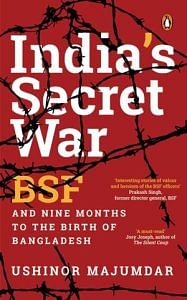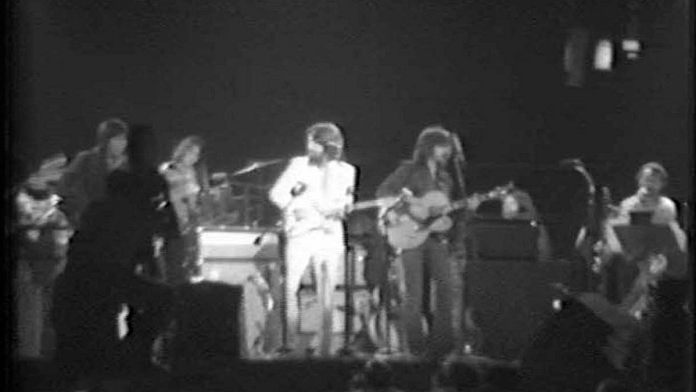The Concert for Bangla Desh, perhaps the most popular example of that activism, was organized by the sitar virtuoso Pandit Ravi Shankar and his friend and former member of the Beatles, George Harrison, on 1 August. Shankar had approached Harrison to help raise $25,000 for the refugee camps for East Pakistani asylum seekers in India. The event—two shows on the same day—was a success and raised around $10 million, of which $2 million was sent that same year through UNICEF. Much of the funds raised came from the sales of records released by the artistes: the single ‘Bangla Desh’ by Harrison and ‘Joi Bangla’ by Shankar.
The music concert also featured sarod player Ustad Ali Akbar Khan and tabla player Ustad Alla Rakha, the doyens of Indian classical music, and American music icons Eric Clapton and Bob Dylan. Both Pt Ravi Shankar and Ustad Ali Akbar Khan had roots in East Bengal. The concerts were attended by a number of African journalists and created a global buzz. Documentaries on Cyclone Bhola and the genocide in East Pakistan shown during the event had a great effect.
The news of the genocide, of the flight of millions of Bengalis from East Pakistan, of the deaths by cholera and of the revolution created quite a stir in the West. For the American public, the information that the genocide was sponsored by guns and ammunitions supplied by their government came as a shock. Support for East Pakistanis poured in from all over the world, and several other cultural figures also contributed to raise awareness about the genocide and civil war. A few weeks after the Concert for Bangla Desh, US senator Edward Kennedy visited the refugee camps in Tripura and West Bengal.
Another noteworthy cultural contribution was by the American beat poet Allen Ginsberg, who travelled to India in September 1971 and wrote the famous poem ‘September in Jessore Road’. Ginsberg was travelling to Calcutta eight years after his last visit to India. He was a guest of the Bengali poet Sunil Ganguly, and the two of them went down Jessore Road, stopping at refugee camps on the way and speaking with asylum seekers headed west to Calcutta from the Petrapole–Benapole border. Bob Dylan, who had performed at the Concert for Bangla Desh, recorded the poem with Ginsberg.
Millions of souls nineteen seventy one
homeless on Jessore Road under grey sun
A million are dead, the million who can
Walk toward Calcutta from East Pakistan
Taxi September along Jessore Road
Oxcart skeletons drag charcoal load
past watery fields thru rain flood ruts
Dung cakes on treetrunks, plastic-roof huts
In his poem, Ginsberg described the despair and tragedy that he saw unfolding on the way to and at the border. The context was unmistakable. The US of 1971 was fighting wars in Asia, and the refugees of East Pakistan had fled the genocide orchestrated by the American ally in South Asia, Pakistan. Most of Pakistan’s weaponry was supplied by the US, and the Bangla Desh government pointed out multiple times that the weapons supplied to defend Pakistan were used against its own citizens.
The BSF facilitated as much cultural and news media coverage as it could at the borders. Like Ginsberg, many people would travel right down to the borders to meet with the asylum seekers. At the same time that Ginsberg visited Calcutta, the BSF PRO Samar Basu also organized a trip for a features team of the All India Radio to the India–East Pakistan border.
The star of the radio team was the legendary radio artiste and Padma Shri awardee Melville de Mellow. In September 1971, he travelled close to Raiganj in northern West Bengal and recorded an interview with one Sylvia O’Connor about the aid work she was doing at the refugee camps, tending to the women and children in the camps and to the wounded freedom fighters. Little known to anyone at the time was that Sylvia O’Connor was living there with her husband, who was the commanding officer of 70 Bn of the BSF. She would go on to win an international award for her aid work in the refugee camps. Her husband, Lt Col Noel Gregory O’Connor, was awarded with a Vir Chakra for his role in leading the BSF during the Battle of Bantara in November 1971.
 This excerpt from Ushinor Majumdar’s ‘India’s Secret War’ has been published with permission from Penguin Random House India.
This excerpt from Ushinor Majumdar’s ‘India’s Secret War’ has been published with permission from Penguin Random House India.



